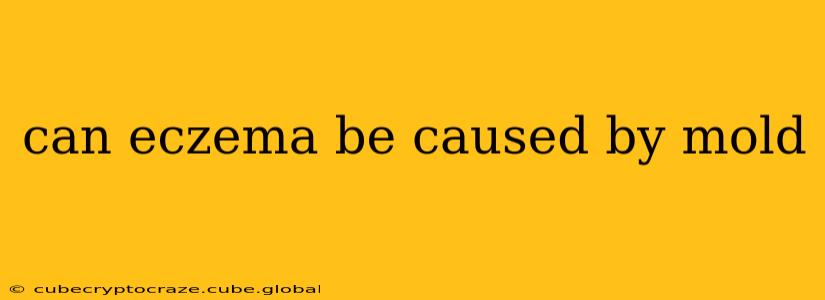Eczema, also known as atopic dermatitis, is a chronic inflammatory skin condition characterized by itchy, dry, and inflamed skin. While not directly caused by mold in the way a virus causes the flu, exposure to mold can significantly exacerbate eczema symptoms and trigger flare-ups in susceptible individuals. The relationship is complex and not fully understood, but mounting evidence suggests a strong correlation. This article explores the potential link between mold and eczema, addressing common questions and concerns.
How Does Mold Affect Eczema?
Mold exposure doesn't directly cause eczema, but it acts as a potent irritant and allergen for many people. Mold releases microscopic spores that float in the air. When inhaled or touched, these spores can trigger allergic reactions in individuals with pre-existing sensitivities. This allergic response manifests in various ways, including:
- Increased inflammation: Mold exposure can worsen the already-present inflammation in eczema-prone skin, leading to more intense itching, redness, and dryness.
- Skin irritation: Direct contact with mold can cause a contact dermatitis, a type of rash characterized by redness, itching, and blisters. This is distinct from eczema but can easily worsen existing eczema symptoms.
- Weakened skin barrier: Mold exposure can disrupt the skin's protective barrier, making it more vulnerable to irritants and allergens, further contributing to eczema flare-ups.
- Exacerbation of existing symptoms: Even without a direct allergic reaction, the presence of mold can worsen existing eczema symptoms, making them more severe and persistent.
Can Mold in the Home Cause Eczema Flare-Ups?
Yes, mold in the home is a significant concern for individuals with eczema. Homes with high humidity, water damage, or poor ventilation are particularly susceptible to mold growth. Inhaling or touching mold spores in the home environment can trigger or exacerbate eczema symptoms, leading to discomfort and impacting quality of life. Regular cleaning and maintenance, along with addressing any water leaks promptly, are crucial to minimizing mold exposure at home.
What are the Symptoms of Mold Allergy and Eczema?
Distinguishing between eczema symptoms and those related solely to mold allergy can be tricky, as they often overlap. However, some symptoms might point more strongly towards mold allergy:
- Respiratory symptoms: Mold allergies often manifest with respiratory symptoms like sneezing, coughing, runny nose, and wheezing, alongside skin issues. These are less commonly associated with eczema alone.
- Specific location of the rash: If the rash is concentrated in areas frequently exposed to mold, such as around windows or in damp areas, it suggests a possible link to mold exposure.
- Timing of flare-ups: Noticeable worsening of eczema symptoms following exposure to a visibly moldy environment strengthens the association.
How is Mold Allergy Diagnosed?
A thorough medical history and physical examination are essential. Allergy testing, such as a skin prick test or blood test, can identify sensitivities to specific molds. Environmental testing of the home for mold is also valuable to confirm or rule out exposure as a contributing factor. A dermatologist can accurately diagnose eczema and help determine if mold exposure is exacerbating the condition.
How Can I Reduce My Exposure to Mold?
Reducing mold exposure is crucial for managing eczema. Steps include:
- Regular cleaning: Regularly clean and disinfect areas prone to mold growth, such as bathrooms and kitchens.
- Repair water damage immediately: Promptly repair any leaks or water damage to prevent mold growth.
- Improve ventilation: Ensure adequate ventilation in your home to reduce humidity.
- Use a dehumidifier: In damp climates, a dehumidifier can help control humidity levels.
- Air purifiers with HEPA filters: These can help remove mold spores from the air.
Is there a Treatment for Eczema Caused by Mold?
There isn't a specific treatment for eczema caused by mold, as mold itself doesn't directly cause the condition. However, managing eczema triggered or worsened by mold involves addressing both the underlying eczema and the mold exposure. This includes:
- Eczema management: This typically includes topical corticosteroids, emollients, and other treatments to control eczema symptoms.
- Mold avoidance: Minimizing mold exposure through the methods discussed above.
- Allergy treatment: If a mold allergy is confirmed, allergy shots (immunotherapy) may be an option.
Mold exposure can significantly worsen eczema symptoms. While not a direct cause, the inflammatory and allergenic properties of mold play a considerable role in triggering flare-ups. By understanding the relationship between mold and eczema, individuals can take proactive steps to manage their condition effectively. Always consult a dermatologist or allergist for accurate diagnosis and personalized treatment plans.
